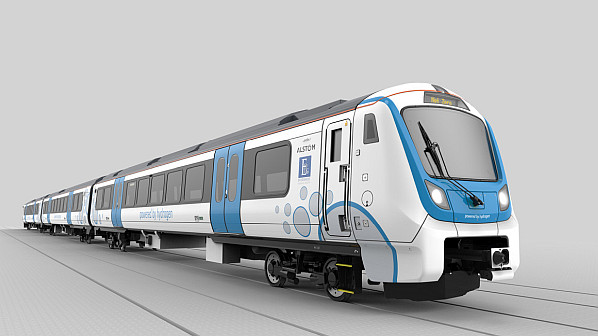EVERSHOLT Rail has signed a Memorandum of Understanding (MoU) with Alstom, aimed at delivering Britain’s first brand-new hydrogen train fleet.
The rolling stock leasing company and Alstom have agreed to work together to share technical and commercial information required for Alstom to design, build, commission and support a fleet of 10 three-car hydrogen multiple units (HMUs).
Alstom told IRJ that details regarding delivery will be confirmed should the agreement be turned into a firm contract.
“There is a significant market interest in new hydrogen trains and both companies are already talking to a number of potential operators,” Alstom spokesman, Mr Will Tanner, told IRJ. “As it sets out in the Traction Decarbonisation Network Strategy (TDNS), Network Rail is clear that hydrogen trains will be required in significant numbers.” He said both the manufacturer and the Rosco will pursue all appropriate deployment opportunities and assist operators in preparing business cases for introducing the technology.
The HMUs will be built by Alstom in Britain, although the manufacturer would not confirm if that would be at Derby Litchurch Lane or Widnes. The trains will be based on the Aventra design platform. Alstom says the intention is that the final contracts for the fleet will be signed early next year.
“It is important that we start sooner rather than later to decarbonise if we are to meet the 2050 net-zero target,” says Ms Mary Kenny, Eversholt Rail CEO. “Hydrogen propulsion will play an important role, and this project with Alstom will demonstrate how the private sector can work together to make a difference.”
The two companies collaborated on the Breeze project to convert a redundant class 321 EMU into a class 600 HEMU. This has yet to operate on the main line. Alstom says both companies now believe that there is a market for a fleet of new trains for use by operators across Britain and that experience from the Breeze project will be used for the Aventra.
“Following publication of the TDNS and Transport Scotland’s Rail Decarbonisation Action Plan, there is a clear need and market appetite for new hydrogen trains,” Tanner told IRJ. “This has secured the case for investment.
“We learned a lot from our work on Breeze, but there is a finite supply of trains for conversion and to meet the anticipated UK market need, we would have needed to transition to a new platform anyway. Moving to Aventra now, an established platform with 2685 vehicles already ordered, also fits well with sponsors’ desire to rationalise fleet types.”
Tanner says using the Aventra platform also allows for more advanced onboard systems, integrated diagnostics and reduced maintenance, but Alstom will continue pursuing the option of converting existing trains to hydrogen operation as the manufacturer believes it is sensible to maintain the option of upcycling existing trains.
For an in-depth look at hydrogen projects across the globe and whether it’s the right alternative fuel, read the October edition of IRJ or click here.
For in-depth data on fleet orders from across the world, subscribe to IRJ Pro.

